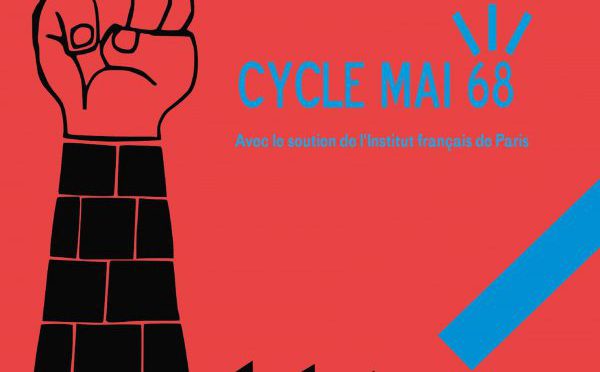
Venue & time: Marc Bloch Center (Germaine Tillion room, 7th floor, Friedrichstr. 191, Berlin), from 10 to 5:30 pm
Organizers: Catherine Gousseff (Marc Bloch Center – CMB), Sylvie Robic (Nanterre University), Clara Royer (CEFRES), Dominique Treilhou (French Institute in Berlin)
Partenaires : CMB, French Institute in Berlin, Paris-Nanterre University and CEFRES
Languages: French, German and English
This conference takes place within the May 68 Cycle taking place in Nanterre, Berlin and Prague, which centers around conferences, round tables, exhibitions and screenings dedicated to the year 1968.
From the Berlin February demonstration against US involvement in the Vietnam War, through the March student protests in Poland and the student unrest in Italy, to Prague Spring or French May ’68, a insurgent spirit swept across the European continent in 1968. The chronicle of the events that shook in different ways European societies, suggests the existence of a rebellious impetus that ignored the Iron Curtain and defied the various political regimes in place. The 1968 new generation held a common ground as they dared asserting their aspirations, upsetting the established order. Still, the diversity of protest configurations, whether speaking of the actors engaged in them or of the political answers prompted by the events, calls for a confrontation of these historical moments which, caught between celebration and tragedy, have become engraved in collective memory.
On the 15th of May, witnesses of 1968 from various parts of Europe will speak about the expectations they had then.
The next day, on the 16th of May, the conference will propose a reflection between East and West through the gathering of specialists on three major topics: violences in 1968, the emergence of women’s movements and the birth of alternative cultures.
What disparities, what common trends can be perceived in the rebellious spirit of 1968?
Continue reading May 68 Cycle Prague/Berlin – West Winds, East Winds →
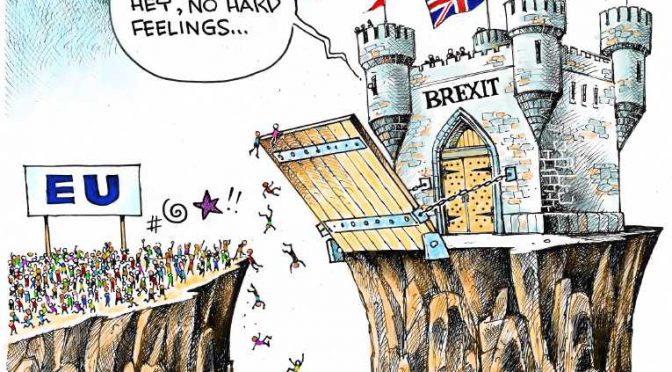
Normalizing Uncertainty. Tracing Brexit-Effects in the Lives of Slovak and Czech Roma Migrants in Britain (and Beyond)
A lecture by Jan Grill (University of Valle, Colombia)
Time & Venue: 5 pm, CEFRES Library (Na Florenci 3, Prague 1)
Organizer: CEFRES, Prague Forum for Romani Histories at the Institute of Contemporary History AV CR
Language: English
Abstract
This paper explores the effects of Brexit on the lives of Slovak and Czech Roma migrants in Great Britain through what can be called ‘normalizing uncertainty’. Coming alongside other East European migrants, some Roma networks started to move in search of more viable lives following the EU enlargement in 2004. Various studies have documented negative impacts the Brexit debates had on the lives of migrants, ranging from increased sense of uncertainty and rupture to the intensified modes of racialisation and xenophobic discrimination. Drawing on a long-term ethnographic research in the UK and in Slovakia, the present paper focuses not just on the level of discourses and narratives recorded in the aftermath of Brexit vote (elicited by researchers’ efforts and interviews) but rather tries to situate these within a long-term practices and relations vis-a-vis dominant societies and forms of being exposed to oppressive social forces and forms of violence and stigmatization. Drawing on relational sociological and anthropological perspectives, this paper examines different ways of coping with and responding to the pre/post-Brexit depending on social positions various migrants’ occupy within different social fields and the durable dispositions acquired against the backdrop of different modes of domination experienced in Central Eastern Europe and in Great Britain.
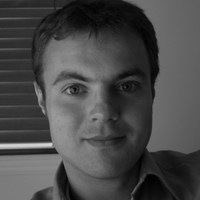 Jan Grill is Assistant Professor of Sociology at the University of Valle, Colombia. He is also Research Associate at the Department of Social Anthropology at the University of Manchester. He has conducted extensive ethnographic research among Slovak, Czech, and Hungarian Roma/Gypsy groups, exploring issues related to different forms of migration from Central Eastern Europe to the United Kingdom and Canada. He has also carried out research on uneven mobilities in the city of Cali, Colombia. His central research interests are migration, ethnicity, racialization, marginality, labour, and the ethnography of the state. His recent publications include ‘Re‐learning to labour? ‘Activation Works’ and new politics of social assistance in the case of Slovak Roma’, Journal of Royal Anthropological Institute (2018); ‘“In England, they don’t call you black!” Migrating racialisations and the production of Roma difference across Europe’, Journal of Ethic and Migration Studies (2017); and ‘Struggles for the folk: politics of culture in Czechoslovak ethnography, 1940s-1950s’, History and Anthropology (2015).
Jan Grill is Assistant Professor of Sociology at the University of Valle, Colombia. He is also Research Associate at the Department of Social Anthropology at the University of Manchester. He has conducted extensive ethnographic research among Slovak, Czech, and Hungarian Roma/Gypsy groups, exploring issues related to different forms of migration from Central Eastern Europe to the United Kingdom and Canada. He has also carried out research on uneven mobilities in the city of Cali, Colombia. His central research interests are migration, ethnicity, racialization, marginality, labour, and the ethnography of the state. His recent publications include ‘Re‐learning to labour? ‘Activation Works’ and new politics of social assistance in the case of Slovak Roma’, Journal of Royal Anthropological Institute (2018); ‘“In England, they don’t call you black!” Migrating racialisations and the production of Roma difference across Europe’, Journal of Ethic and Migration Studies (2017); and ‘Struggles for the folk: politics of culture in Czechoslovak ethnography, 1940s-1950s’, History and Anthropology (2015).

International Interdisciplinary Workshop for Young Researchers
Organizer: Julien Wacquez (EHESS, CESPRA, CEFRES)
Partners: CEFRES, Institute of Philosophy of the Czech Academy of Sciences, EHESS (Paris)
When & Where: 23rd of May 2018, FLÚ AV ČR, conference room (Jilská 1, Prague 1 110 00)
Language: English
See the call for papers here
See the abstracts of the lectures here: Abstracts.
Since their foundation, social sciences have been questioning the practice of scientific writing as well as its limits and effects. To what extent does writing in itself affect the production of knowledge? How are the norms of scientific writing constantly negotiated? How are scientific texts convincing their readership?
Professors and young researchers are invited, not only to explore such questions, but also to share their own experiences as scientific writers. What kinds of problems do we face when striving to transform our investigations into a text? What kinds of narrative and rhetoric strategies do we implement in order to tackle such problems?
Because writing scientific texts is both a lonely and a collective activity, this workshop aims to develop a better understanding of the writing choices that we can make (between following or transgressing the “accepted” norms of writing of our discipline).
Program
9:30-10:00 – Welcome
10:00-10:30 – Introduction
Jan Balon (FLÚ AV ČR)
10:30-12:00
Panel 1. (re)Producing new norms of writing
- Julien Wacquez (EHESS-CESPRA & CEFRES)
The Ways of Science Fiction in the Study of the Anthropocene
- Annibal Arregui (CEFRES-FSV UK)
Straw-Men of Science: “Hologrammatic” Dichotomies as Academic Sparring
Chair: Jan Balon (FLÚ AV ČR)
Lunch break
13:30-15:30
Panel 2. Writing Science and/or Writing Politics
- John Holmwood (University of Nottingham)
Writing for Justice. When Other Lives Are at Stake
- Jitka Wirthová (ISS FSV UK)
How to Write the Proof: Creating Expertise in Strategic Documents for Educational Reform
- Abdul Qadar (EHESS-LAS)
Writing as a Punjabi Native Anthropologist: Understanding the Relationship between Ethnographic Text, Self of an Anthropologist and Representation
Break
16:00-18:00
Panel 3. The Social Scientist as a Writer
- Jean-Louis Fabiani (EHESS & CEU)
The Impossible Novelist: Portrait of the Sociologist as a Frustrated Writer
- Fanny Charrasse (EHESS-LIER)
Literary but Not Fictional
- Edouard Chalamet-Denis (EHESS-CESPRA)
Via Hayden White: Questionning Narrative and Opening Possibles in the Writing of History
Illustration: Edgar Degas, Portrait of Edmond Duranty (1879)
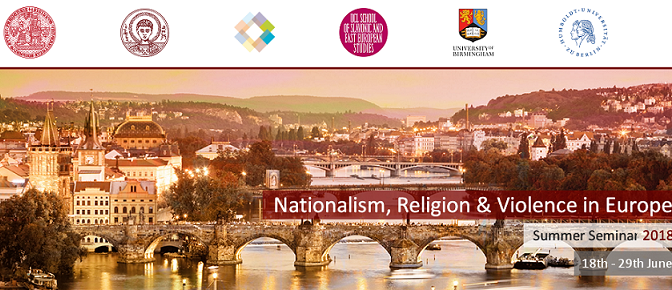
Summer Seminar
Where & When: Prague, 18-29 June 2018
Organizers: Charles University and Aristote University of Thessaloniki
Partners: CEFRES–French Research Center in Humanities and Social Sciences, School of Slavonic and East European Studies (UCL), University of Birmingham and Humboldt University of Berlin
See the program below
The Summer Seminar on Nationalism, Religion and Violence is ready to launch its sixth year with a special focus on the topics of ethnic and religious diversity, migration and transformation. A key goal of the Summer Seminar is to contribute to the study of violence in a substantial way and to catalyze the growth of the study of violence as a field.
The seminar targets highly motivated students, particularly graduate students, as well as post-docs and professional activists. It is led by international researchers from universities with an excellent reputation, such as the Humboldt University of Berlin, Central European University (Budapest), the University of Birmingham, the University of Manchester, the University of Pennsylvania, Eötvös Loránd University (Budapest) and the Taras Shevchenko National University of Kyiv. The program involves fieldwork designed in cooperation with research centers and international institutions in Prague and beyond.
For more details please visit the website of the Nationalism, Religion and Violence Summer Seminar.
Continue reading Nationalism, Religion and Violence →
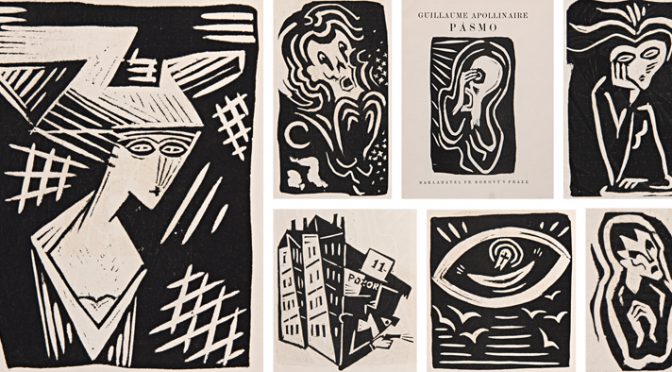
As the exhibition Notre France. La poésie française dans les traductions et les illustrations tchèques du XXe siècle, organized by the Museum of Czech Literature is about to open on 11th of May in Hvězda Summer Palace in Prague, CEFRES organizes a roundtable around the translation of poetry. The exhibition, open until the 31rd of October, 2018, is organized in the frame of the « 2018 European Year of Cultural Heritage » program and of the project “Un Siècle commun” [A Shared Century].
Venue: French Institute in Prague, 5th floor (Štěpánská 35, Prague 1 110 00)
Time: 6-8 pm
Language: French
Speakers:
- Robert Kolár (ÚČL AV ČR)
- Guillaume Métayer (CELLF-CNRS)
- Jiří Pelán (FF UK)
- Jovanka Šotolová (FF UK)
Chairs: Antoine Marès (Université Paris 1 Panthéon-Sorbonne) and Clara Royer (CEFRES)
Illustration: Linocuts by Josef Čapek for Pásmo (Zone), 1919, by G. Apollinaire, translated into Czech by Karel Čapek
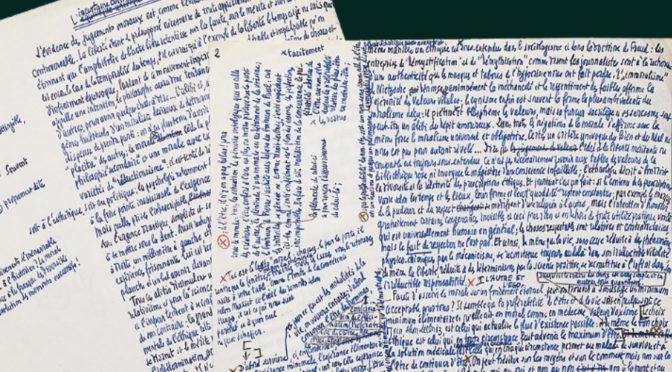
International Conference
Organizers: Benedetta Zaccarello (CNRS-CEFRES) and Thomas C. Mercier (CEFRES / FHS UK)
When & Where: 7-9 June 2018 at the French Institute of Prague, 5th Floor, Štěpánská 35, 110 00 Prague 1
Partners: FHS UK, The Jan Patočka Archive, FLÚ AV ČR, ITEM (CNRS-ENS), Bibliothèque Nationale de France, The Wittgenstein Archives at Bergen University, with the support of the French Institute in Prague and the program PARCECO of the MENESR
The conference will comprise four sections:
- Archive (Hi)stories: Thinking Theory through Authors’ Manuscripts.
- Archives in the digital age.
- What archives do to philosophy: methodologies in editing and interpreting.
- The Political Implications of Archives and their Conservation.
The afternoon session of the first day (7th June) will be dedicated to Jan Patočka and his archives.
See the program below
Abstract
The international conference “The Wording of Thoughts: Philosophy from the Standpoint of its Manuscripts and Archives” aims to establish a dialogue between experts of different archival corpuses coming from various countries and continents, so as to sketch methodological lines and to build a pioneer network focused on philosophical archives. Philosophy is written, practiced, lived through: it is the translation of the experience of a thinking subjectivity in a conceptual alphabet and a verbal fabric. The “making of a philosophical text”, including its cultural features and societal contingencies, challenges the representation of the discipline’s history as a series of abstract findings and innovative intuitions that constitute the landmarks of our paradigms. The philosopher who writes is the first inclined to erase the complex intricacies of the negotiations between existence and theory, between conceptual inventiveness and shared vocabulary inherited from a centuries-old tradition. Yet it is obvious that the dynamics of philosophy production and reception are a complex phenomenon whose writing nature is a crucial stake.
For all these reasons, the philosophical manuscript is an odd object that has only recently started to receive proper appraisal. In Europe, nevertheless, the creation of archive centres gathering major philosophical data has sustained the memory of philosophical writing and enabled such “arches” to cross time. It is beyond doubt that accessing these archives often enables to better understand the appearance, the method, the approach and even the sources, along with the polemical targets and the hints that published books tend to excise or dim. Moreover, in exploring the history of several philosophical archives and their rooting in specific social and cultural contexts, we aim to appreciate the role of such archival materials and their importance so as to develop new approaches to philosophical studies, including the history of philosophy and the exegesis of theoretical thought.
Continue reading The Wording of Thoughts. Philosophy from the Standpoint of its Manuscripts and Archives →







